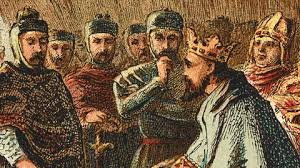
Introduction to the Magna Carta
Teaching idea: For Years 3-6
What is the meaning of Liberty?
Why should a King operate within the Law?
As a class or groups conduct a survey of students in the school asking what rules should be in place for the whole school and what rights the members of the school community should be entitled to. Once the survey has been conducted groups should create their own "Great Charter" that could be presented to the Principal for signing on the 800th Anniversary of the Magna Carta on the 15th June 2015.
Freedom of Choice and the Law - The Flip Side of Bike Helmet Laws
Primary Government and Democracy
Australian Curriculum Links
How and why decisions are made democratically in communities (ACHCK002)
How and why people make Rules (ACHCK002)
Distinguish facts from opinions in relation to civics and citizenship topics and issues (ACHS005)
Use information to develop a point of view (ACHCS006)
Present ideas and opinions on civics and citizenship topics and issues using civics and citizenship terms (ACHCS009)
Overview
This lesson explores why laws are made that may be interpreted as controlling an individual’s freedom to choose how to act. Students will consider the law and who it is protecting and how the choices of an individual can have far reaching effects on the community, resources and family.
Key Questions
Why do laws need to pass through both houses of parliament to gain approval?
Why do we have laws? Why are they important in a democratic society?
How do laws improve the society in which we live?
Activities
- Watch the video by the Parliamentary Education Office on how laws are made.http://www.peo.gov.au/multimedia/video/makingALaw/transcript.html
- Discuss the reasons why the “Bill” needs to be debated and passed in both houses of parliament? How does this process ensure our laws suitable for the whole state or country? Refer to Discovering Democracy stimulus and resources http://www1.curriculum.edu.au/ddunits/units/mp2rules-glance.htm
- Watch the Yaba video “The Flip Side of Bike Helmet Laws”.
- In groups students make a chart of WHO the law benefits (Individuals, Families, emergency service people)? WHAT resources are impacted (eg: medical, emergency services, long term carers)? WHY the law is necessary/unnecessary.
- Students develop a response to the video by drafting and going through the process of editing a persuasive text giving both facts and their opinion about either the subject of Bike Helmet Legislation or the reason why the making of laws such as Bike Helmets are an important part of Democratic process.

